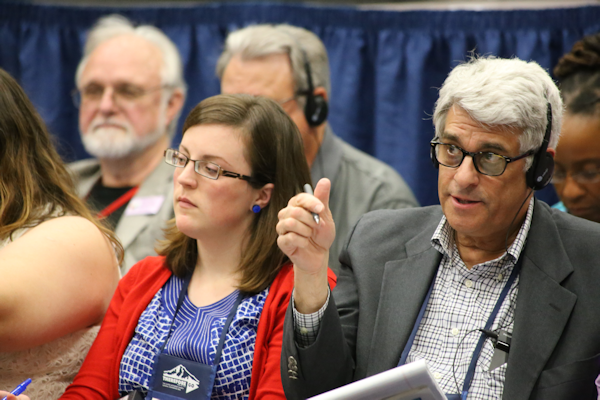A first-time delegate to General Conference reflects on the “linguistic iceberg” encountered in worship and legislation.
REV. MEGAN WALTHER
Reserve Delegate, Detroit Conference
On our honeymoon, my husband and I got stranded in the Hungarian countryside. Joel and I were traveling on a local train to visit friends, when the train stopped at a small rail station in a rural area. After sitting at the station for a few minutes, a conductor made an announcement in Hungarian – and suddenly everyone got off the train. I do not speak Hungarian (neither does Joel), so we were baffled. What was going on?! We were ushered onto the crowded platform with the rest of the travelers. We couldn’t find anyone at the station who spoke our language, and our attempts to use the few Hungarian words we knew were met with confusion.
After half an hour, some of the travelers started getting on buses that had arrived. Others were cramming onto a new (unmarked) train that had pulled into the station. Where were the buses going? Where was this new train headed? Could we still make some kind of connection to our original destination…? Without someone who spoke our language it was difficult to know what was happening. Eventually we jumped on a passing train, reached a larger city where someone spoke English, and found our way to our friends’ village. (We later found out that they had started calling train stations across the country asking if anyone had seen two lost Americans.)
It can be challenging to function in a place where your language is not commonly known. And yet many of the delegates to General Conference do this every four years as they take part in the work of the global church. Most of the business of General Conference is conducted in English, but a rich variety of languages are present among us. I have heard delegates speaking in French, Russian, Spanish and Portuguese during the course of General Conference, and that’s just the tip of the linguistic iceberg.
“Slow down, you’re speaking too quickly!” This has become a refrain in my legislative session. Many delegates rely on translation to follow the business of General Conference, and it’s difficult to translate someone speaking speedily and without pause.
Pausing is not a bad idea.
James 1:19 reminds us to be “quick to listen” and “slow to speak”, and yet often we are not only quick to make a speech – we are quick IN our speech. Communicating well across languages (not to mention cultures) can take a little extra time. I speak only one language fluently. I’ve learned bits and pieces of various languages over the years, but I am nowhere near being able to hold a conversation, let alone translate anything for anyone else. I am grateful for the talent and knowledge that allows people from around the world to come together in worship and debate.
The presence of so many languages reminds me of the power and vastness of God. I may not understand Hungarian, but God does. I may not speak Kiswahili, but God can. When we gather in worship, it does not matter what language we are using: God comprehends. We recently sang Amazing Grace together “in the language of our hearts”, and it was beautiful to hear the variety of voices. In the midst of the legislation and debate, the body of Christ is gathered. Praise be to God.
Last Updated on May 13, 2016

